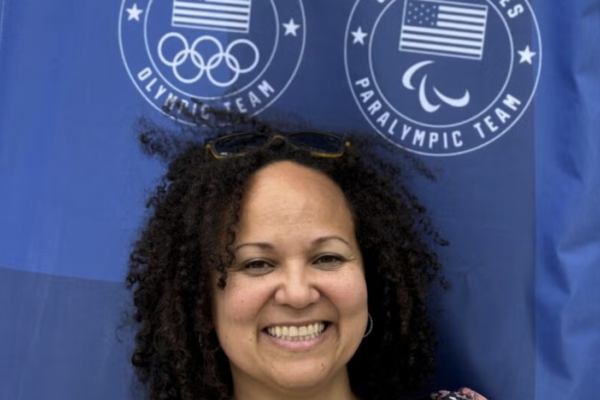Pandemic Pivots
How McCombs students, faculty, and alumni changed during uncertain times
By Sharon Jayson and Matt W. Turner | Illustrations by Yann Sadi

McCombs students, faculty members, and alumni showed resilience, creativity, and determination in a strange, new world brought on by the pandemic.
They all pivoted. Faculty members moved to online instruction, students found ways to network and fulfill internships, and alumni found new approaches to maintain their livelihoods. Through it all, the McCombs community learned new skills, new strategies for solving problems, and new truths about themselves.
These are their stories.
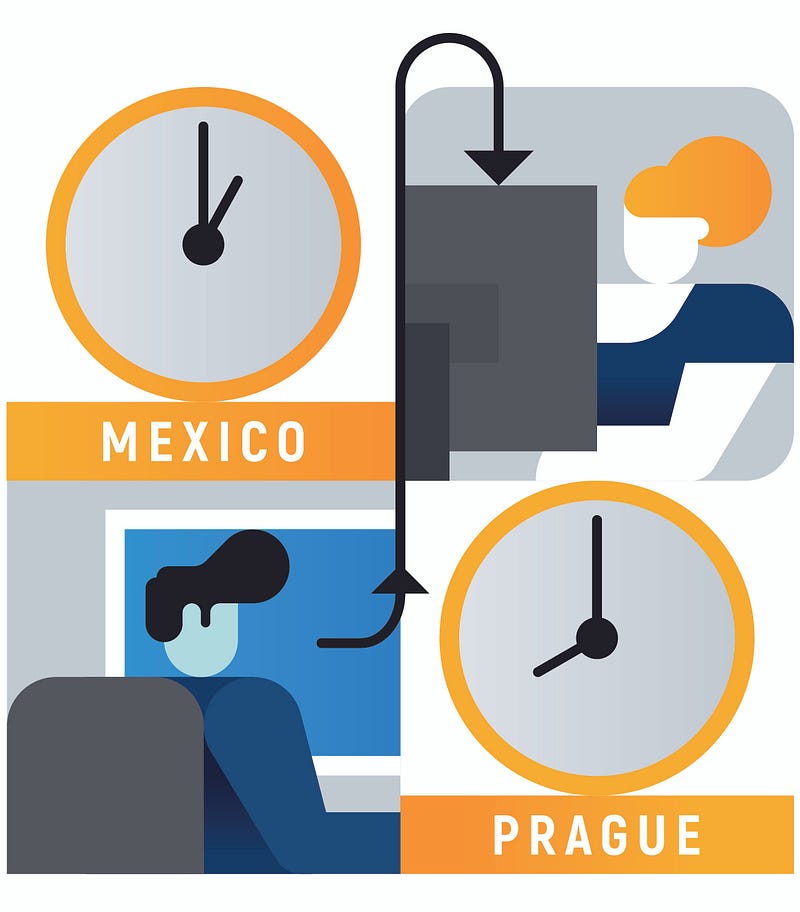
The Remote Intern
Talk about a pivot. The pandemic could have left Rodrigo Rivera, BBA ’21, at loose ends. Instead, he has learned a new skill: adaptability.
In spring of 2020, Rivera’s semester abroad in Prague abruptly ended. He would have to leave but could later resume classes remotely.
“I went in February and came back in mid-March,” he says, explaining that because “most countries in Europe were closed, I had to fly to Istanbul and then to Mexico City” to get back to his hometown of Tampico, Tamaulipas, Mexico.
Tampico is in the same time zone as Austin. So, it was a challenge taking four spring semester classes that were really remote — from Prague.
“I had to take my classes during European hours,” he says. “Classes started in the morning in Mexico, which was afternoon in Prague. It was a seven-hour difference.”
In summer 2020, Rivera had a remote internship with Goldman Sachs in Manhattan. He was still in Mexico, and everyone at the firm worked remotely. “My internship was most challenging,” he says. “It’s different working online and trying to network.”
Still, he made an impression. Goldman Sachs offered him a full-time job in New York, to begin later this summer. Rivera, who arrived at UT in 2017, wrapped up his final semester at McCombs during the spring, with a double major in the Canfield Business Honors Program and finance and a minor in management information systems. He also managed to serve as a research assistant at the Salem Center for Policy through his graduation in May.
Reflecting on the past 15 months, Rivera says he “learned priorities” and the “soft skill to pivot.” — Sharon Jayson
From Pandemic to Passion
Cecilia Laseter, MBA ’15, was trying to figure out her next step when the pandemic made it clear. As the mother of a 1-year-old in March 2020, Laseter, who had worked in corporate marketing at Whole Foods Market Inc., wanted to launch her own business “in a way that allows me to have a balanced life and keep working with a little one.”
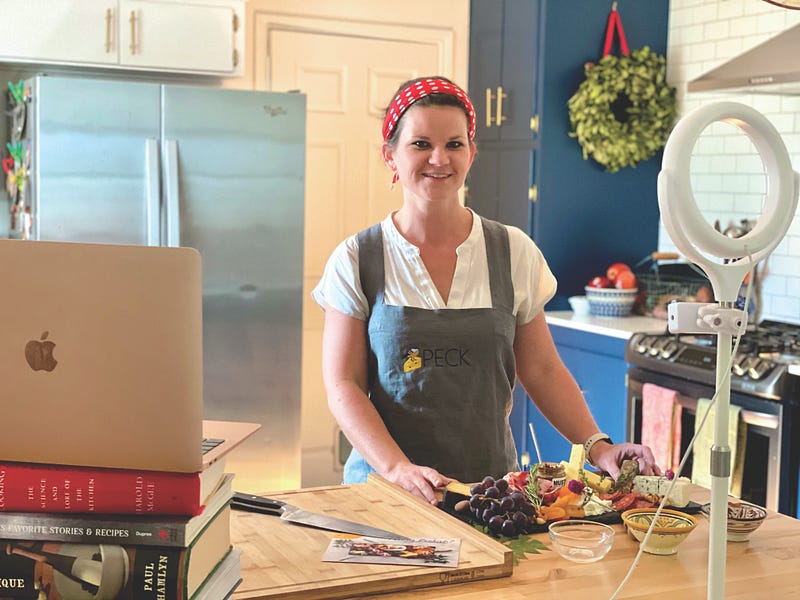
But was launching a new venture a good idea during a pandemic when cities and states were locking down? What would resonate? And then she thought, with more people staying home, demand for home delivery was rising.
“I wanted to do something at the intersection of my passions and my talents,” says Laseter, founder and CEO of Peck Boards, which launched in September 2020. “I’m passionate about good food, and I’ve always worked in e-commerce. And, among my friends and family, I’m famous for charcuterie boards.”
Peck Boards include a variety of meats and cheeses, as well as dried fruit, chocolates, and fig spread, among other extras. The business had a successful holiday season, says Laseter, who lives in Austin. Now, she’s making a five-year plan, which includes increased marketing, hiring some help, and expanding into more DIY home food experiences for businesses and individuals.
“My business strategy rests on one core assumption: that remote working is going to continue,” she says. “The office environment is evolving, and we’re going to be there to help folks celebrate their teams virtually — with delicious food.” — Sharon Jayson
Strategies for Socializing
Sanjana Reddy, BBA ’23, wouldn’t let herself believe she was going to study abroad until it actually happened. After all, this was a pandemic, and many countries’ borders were in flux.
“Definitely, there was a lot of uncertainty,” she says. “Until the last moment, I was doubting whether it would happen. Countries could start enforcing new restrictions. It made me a little nervous. I was ready to go as long as it was possible.” Reddy, a marketing major from Dallas, spent this spring studying at Corvinus University in Budapest as one of a handful of UT students who spent the past semester in Hungary. She was also named one of UT’s Spring 2021 Global Ambassadors, who shared their international experiences blogging and posting photos on Instagram.
“Classes were fully online in the beginning,” Reddy says. “They were hoping we would eventually go to a hybrid format, but that never happened.”
Even so, she was determined to make connections. Reddy met new friends through in-person events organized by a nonprofit international student group. Increased COVID-19 cases in Hungary forced a government lockdown during spring break that curtailed typical travel plans. She ended up exploring the country with friends on day trips and weekend visits at other times during the semester, which made her realize her biggest pivot “was really having to plan out my social interactions.”
“I really took it for granted,” she says. “In the past, I’d meet people wherever I went. I didn’t realize I was a social person until I didn’t have that interaction.” — Sharon Jayson
No Yawning in Class!
Who knew a sneeze could foster class engagement? Teaching more than 500 students a semester across multiple sections this past year, David Quintanilla, a lecturer in the Business, Government and Society Department, finds keeping students’ attention in a live classroom hard enough, but engaging them for an hour or more in “Zoom U”? That challenge is in a class by itself.
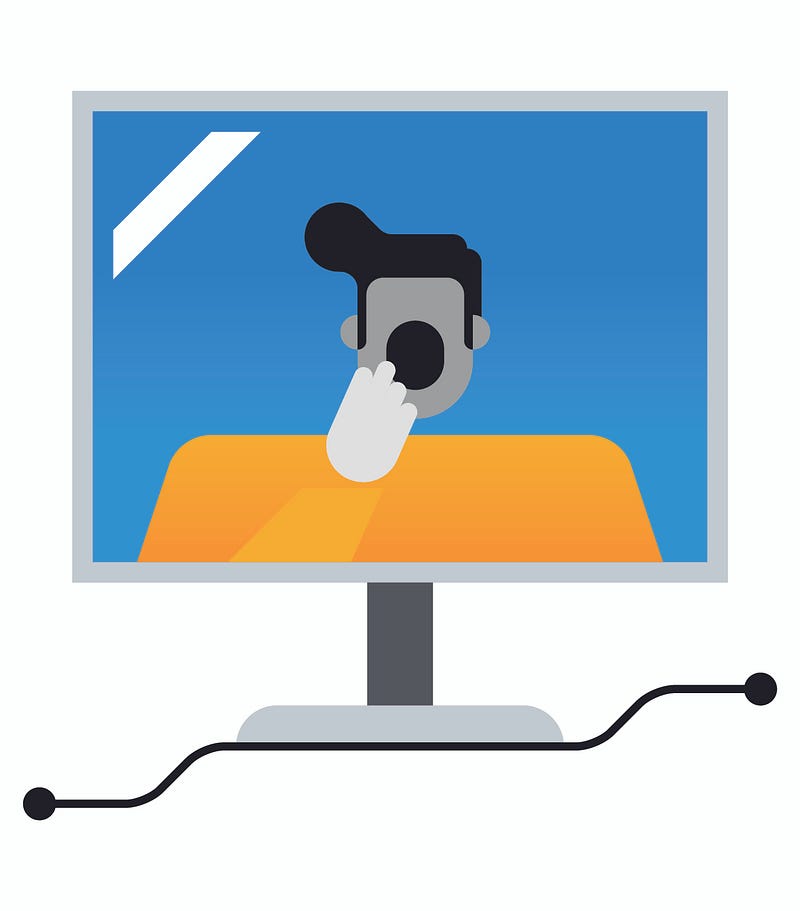
Quintanilla employs an array of techniques to make sure students are following the lecture, but to his surprise, the simplest is the most effective. When teaching in a live classroom, he has a habit of saying “gesundheit” or “bless you” when people sneeze. If someone yawns, he says, “Hey! I saw that yawn,” or “Stay with me. Don’t get too bored,” or “We’re almost there!” When Quintanilla imported these simple acknowledgments to the online world, he was surprised to discover that not only did students laugh just as hard, they knew he was really paying attention to them.
“I’ve heard from many students that this simple thing truly made them feel connected, as if we really had been in a live classroom together.”
Quintanilla recently won the Hank and Mary Harkins Foundation Award for Effective Teaching in Undergraduate Classes. — Matt W. Turner
Discussion Without Pressure
The professor delivers an insightful, thought-provoking lecture, and the students are a) riveted, b) confused, or c) eager to ask a piercing question or offer a brilliant rejoinder?
It’s often difficult to gauge how students are thinking about topics and new concepts, says Insiya Hussain, an assistant professor of management. Even in a live classroom, an instructor only has time for a few student comments, which gives a limited view of how students are processing new information, she says.
The pivot to online instruction motivated Hussain to try a feature of Canvas, the web-based learning management system used by UT and thousands of universities worldwide. She had given only scant attention to it before the pandemic. Hussain posts weekly reflection questions on Canvas’ discussion board feature, which allows students the freedom to discuss their answers with one another, as well as post video and audio files, without the pressure of being put on the spot when called on.
“Discussion boards offer distinct advantages over speaking out loud in the classroom,” she reports.
First, they ensure that 100% of the students have a chance to share their thoughts, which gives the instructor a much better take on their enjoyment and comprehension of the material. They also allow students to shine in different ways, especially those students who are stronger writers than speakers and are hesitant to voice their opinions out loud. Above all, Hussain finds that students are more honest and vulnerable when writing.
“I often ask students to relate the current topic to their own experiences and am amazed at the rich and relevant examples they provide, often talking about personally difficult situations from their own lives,” she says. And the feedback from fellow students to this sincerity can be quite validating.
“This is something I may continue to use even when we resume in-person learning.” — Matt W. Turner
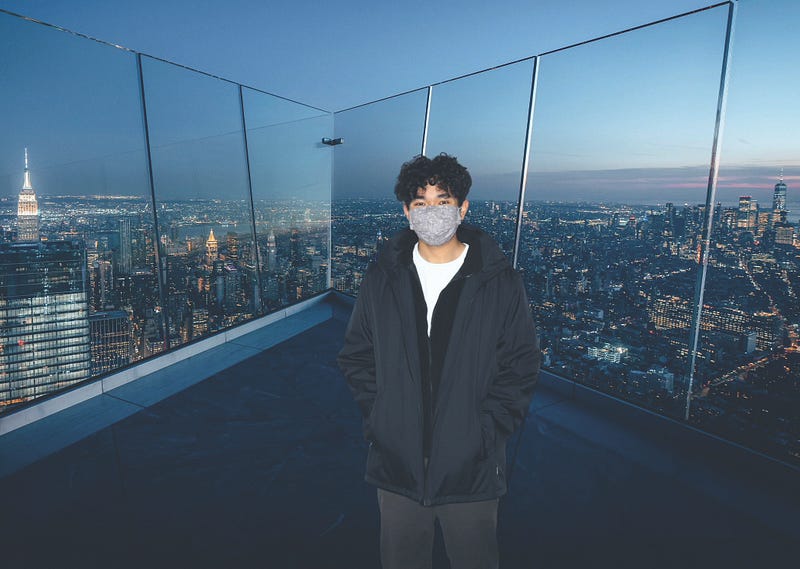
The Internship Juggler
Joseph Tabuena, BBA ’22, had many balls in the air during the spring semester, juggling two internships with UTNY, the university’s internship program in New York City.
There from January through May, he alternated work at two companies where he interned. “Both of them were remote,” says Tabuena. “I never went to either of the actual offices.”
He knew that going in. On Mondays, Wednesdays, and Fridays, he worked at Magnet Media Inc., where he assisted the marketing team with client development. On Tuesdays and Thursdays, he worked for Collegiate Sports Management Group, mostly working on spreadsheets to support marketing and analytics.
“It was a little strange, but that was also what they required at the time I applied,” he says. “They wanted someone in the same time zone for location and convenience.”
He was experienced at adapting to change. In spring 2020 when the COVID-19 outbreak sparked lockdowns worldwide, Tabuena left the UT campus and headed home to Coppell (in the Dallas-Fort Worth metroplex), where he completed his second year of college in his room.
“It was a huge adjustment at first,” he says. “At UT, it’s really easy to separate when you’re working on school and when you’re not. You’re not really able to have that luxury at home. You have to force yourself to stay disciplined at home.”
Tabuena says he did get a taste of collaboration with other interns. One company assigned its dozen interns to work on a final project together.
“I was really excited about New York. I knew it was a great opportunity for my career with the internships and letting me grow more as a person,” he says. — Sharon Jayson
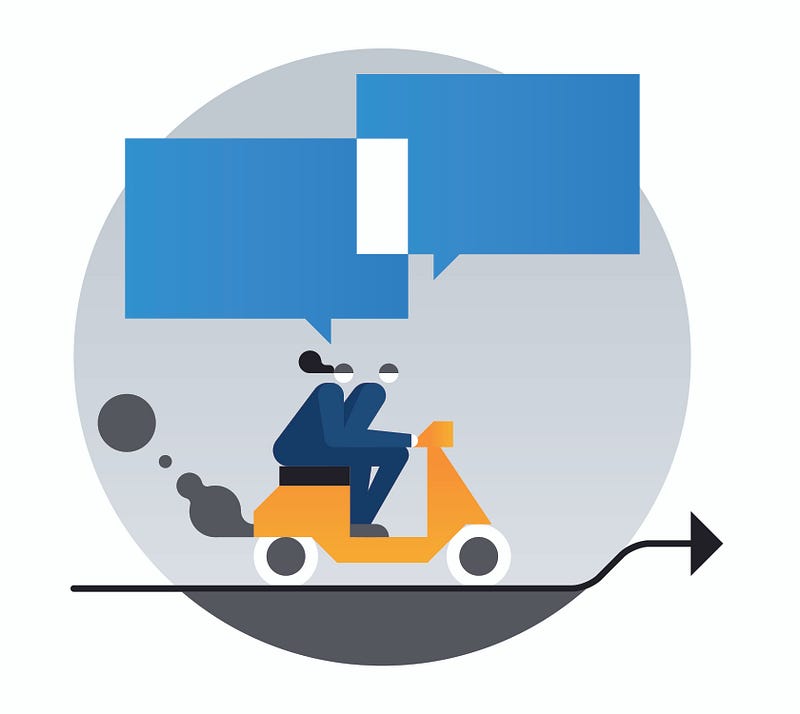
Navigating on Scooters
Keeping a real estate development company thriving during the pandemic presented several challenges to Erik Johnson, MBA ’08, a co-founder of White Point Partners in Charlotte, North Carolina.
White Point’s five-person team got creative, Johnson says, so it could keep its focus on the tenant and capital relationships it had nurtured.
To show properties to potential capital partners when “no one was comfortable getting into a car (with others),” he says, they looked for an alternative. “We found a bunch of electric scooter rentals and brought them to where we needed to start. It ended up being productive, and we were able to see the neighborhood fairly quickly.”
Johnson says navigating on scooters and trying to communicate with the wind blowing was challenging but worked well enough that they did it again.
The company also improvised at its development Optimist Hall, an 1890s-era former gingham mill that had been transformed into a 147,000-square-foot mixed-use development. It opened in August 2019 and had 20 food and beverage tenants when COVID-19 emerged. Johnson says the development’s pivot to curbside and takeout — the only permitted food service allowed in the state in March 2020 — made Optimist Hall “the largest drive-thru in Charlotte.” The rideshare drop-off became the curbside pickup, and the janitorial staff became food runners.
White Point was nimble on its other projects, says Johnson, who serves on McCombs’ Real Estate Investment Fund advisory board. It sold some proposed office developments while proceeding with construction on other projects.
“We took a stand not to drop everything and see what happens and hope it was short-lived,” he says. “As we got further into it and realized it was not going away super quickly, we pivoted.” — Sharon Jayson
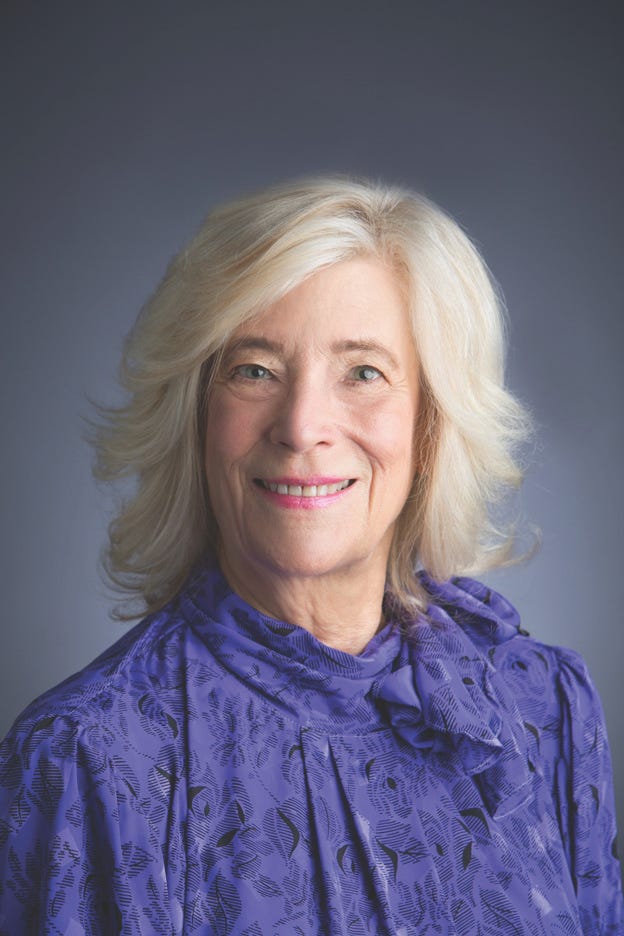
Less ‘Group Think’
Getting to know each student personally, rather than just as a class member, has been the big surprise in the pivot to virtual teaching for Linda Golden, a faculty member in Marketing and Business, Government and Society who holds the Joseph H. Blades Memorial Centennial Professorship in Insurance.
For starters, the simplest tech feature — the placement of student names at the bottom of each Zoom tile — gives instructors a leg up, Golden says. “You can call on students by name early in the semester, instead of waiting weeks until you’ve mastered them.” That also prevents students who might choose not to display their names in a live classroom from sitting on the sidelines, thus leveling the playing field, she says.
But a more remarkable advantage to virtual teaching, according to Golden, is the elimination of “group think.” She found that by setting strict time limits to Zoom’s chat feature, students didn’t have time to read their classmates’ comments, and their thoughts ended up being more original and honest. They were more likely to pose questions they might otherwise be hesitant to ask. When she used the chat feature without time limits, she found that shyer students would “speak up” in front of their peers in writing much more than they would out loud. “Some students are simply uncomfortable speaking in a group even when it is clear that the environment is welcoming to whatever they have to say,” she adds.
Golden used Zoom’s polling feature to take a snapshot of how students were thinking about course material. Because they could not see one another’s answers, she maintains, group think was less likely.
Finally, the online classroom brought professors and students directly into each other’s office and living spaces, complete with decorations, memorabilia, and wandering pets, which opened a window into the lifestyles of others. Not only was this another example of real connection, she says, it injected a bit of “sheer fun” into the learning environment. — Matt W. Turner
Strategic Shift
Cindy Lo, BBA ’98, didn’t know how critical her first moves would be in transforming her Austin-based company Red Velvet from an events-focused agency to one that has successfully melded the in-person hybrid world with the virtual.
On March 6, the day South by Southwest canceled its 2020 festival, Lo says she started receiving cancellations from clients for in-person events taking place through April 2020.
“We became virtual event producers,” she says, giving clients the choice to cancel or stay on and evolve with her company.
By April, the business had added new services and products, including designing T-shirts and selling them online even though it had never sold products. Red Velvet also offered business consulting and résumé assistance — anything it could do to keep customers, she says.
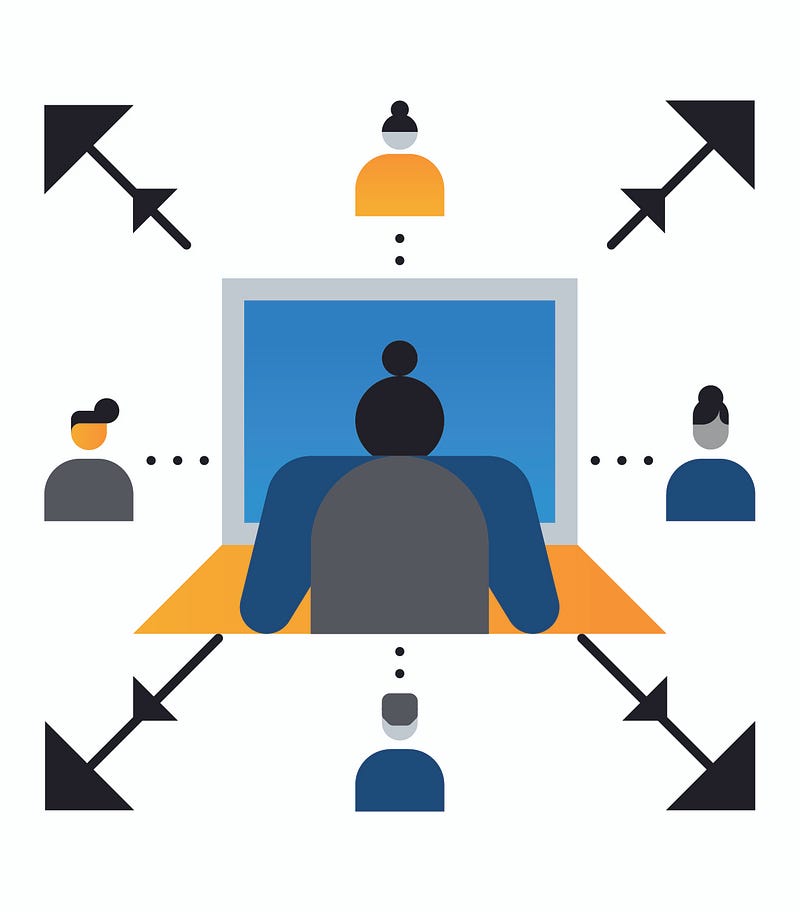
Although Red Velvet had never produced all-digital events, the quick response enabled the company’s first such event by early May. Still, the pandemic took a toll.
“We were 27 when it started. Now, unfortunately, we are 12. I did layoffs that started off as furloughs,” Lo says. “I have not paid myself since April 2020.”
Lo says she lost more than 70% of her business.
“We lost so much business so fast,” says Lo, who serves on the McCombs BBA Advisory Board. “We ended up losing 80% and gained 10% through virtual.
“I’ve done everything I can to keep things going,” Lo says. “I was physically with my family but not mentally with them. Genuinely, I did feel like I was losing everything we built up for 18 years.”
The pandemic solidified Red Velvet’s metamorphosis from being viewed as a “party planner” to an “event strategist.” Now, she says she is poised to rebuild. — Sharon Jayson
Mingling and Meeting
McCombs associate professor Wen Wen’s surprise with the online pivot is that it has increased personal interactions and communication among students and instructors.
In a regular, in-person classroom, Wen, who teaches in the Information, Risk and Operations Management Department, notes that students tend to sit with the same group day after day and discuss class exercises exclusively with one another. Zoom’s breakout rooms randomly assign students to groups across class sessions and even across various exercises within a session. That forces students to interact with people of different backgrounds and perspectives and “significantly enhances their learning experience,” Wen says.
Going virtual also has easily enabled scholars around the globe to connect and learn about one another’s research as never before, she says. Even high-profile researchers who otherwise would decline invitations to travel to campus due to their heavy schedules are more than happy to give virtual research talks.
Another silver lining she cites during this unusual, difficult time: Professors and doctoral students have participated in more academic conferences because of the flexibility and lower costs that being online affords. — Matt Turner
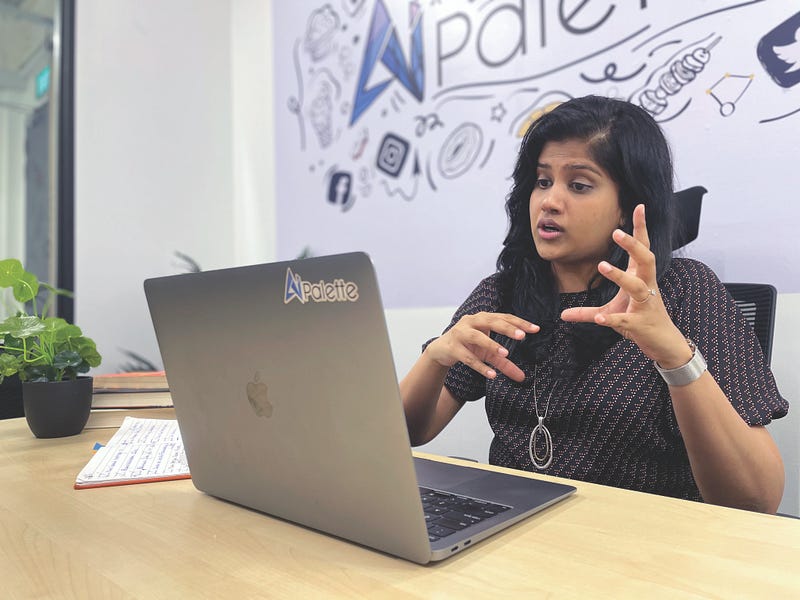
More Nimble Innovation
Salomi Naik, MBA ’16, could never have imagined how prescient her job title as head of innovation would be. The pandemic required a pivot toward more nimble innovation at the startup she joined in July 2019.
“We’re a lean startup always running tight on resources,” says Naik, the first employee hired at Ai Palette, a predictive analytics company. “We had to be very agile and make decisions very rapidly.”
The company is based in the tech hub of Singapore, where Naik also lives. She had made her way from Mumbai to Texas McCombs and then New York City before returning to Asia in 2017. At Ai Palette, the company analyzes public data and uses artificial intelligence to identify food trends, as well as consumer needs and motivations to help client companies create successful product concepts for rapidly evolving tastes.
“In the midst of the pandemic, we were seeing digital data really having its moment in the sun. At a time when traditional research was no longer an option, more people were shopping online and posting more on social media,” Naik says.
With clients across Asia and in the U.S. and Europe, Naik says the company shifted from traveling to meetings to virtual-only sessions. Ai Palette was already analyzing pandemic-inspired food trends when it captured the international spotlight and showed how quickly it could answer its clients’ most pressing questions.
Food Industry Asia, a research and advocacy group, told the team it wanted to better understand how consumer behavior was changing because of COVID-19, Naik says.
“The Food Industry Asia study really helped us get tremendous exposure,” Naik says of the resulting eight reports and seven webinars her company produced. “It reached almost 2,500 C-suite executives across 43 countries.” — Sharon Jayson
This article appeared in the summer 2021 issue of McCombs magazine. Click on the link to see the full issue.
About this Post
Share:
